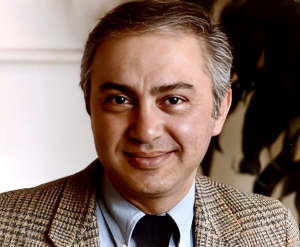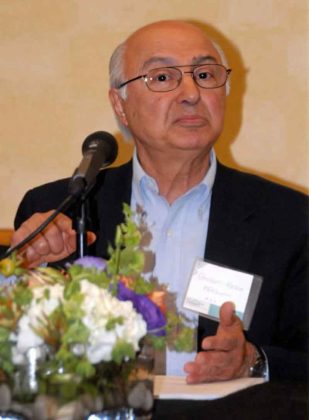By Kayhan Life Staff
Gholam Reza Afkhami, Iran’s Deputy Interior Minister before the Revolution, who also served as a professor of political science at the National University of Iran and as Secretary General of Iran’s National Committee for World Literacy Program, passed away in the United States.
Afkhami was the author of “The Life and Times of the Shah,” published in 2009 and one of many books which he published in exile. The biography of Mohammad Reza Shah is considered a detailed and well-researched account of the Shah’s life and reign.
Gholam Reza Afkhami was born in 1936 in Tehran, into a family that valued education and intellectual achievement. He attended the University of California, Berkeley and continued his education at University of Colorado, earning a Ph.D. in Political Science. Afkhami then returned to Iran, where he joined the faculty at the National University of Iran as a professor of political science.
Afkhami’s academic work focused on political theory, the role of the state in development, and the challenges of governance in developing nations. He was particularly interested in the dynamics of political modernization, exploring how traditional societies such as Iran could transition to modern political systems without losing their cultural identity. His writings during this period reflected a deep understanding of the complexities of Iranian society and the challenges of political reform.

As Secretary-General of Iran’s National Committee for World Literacy Program, Afkhami was a leading figure in efforts to reform Iran’s educational system — from expanding literacy in rural areas to improving the quality of university education. He advocated for curriculum reforms that integrated modern scientific and technical education with traditional Iranian values, aiming to produce graduates who could contribute to Iran’s economic and social development.
The Iranian Revolution of 1979 was a watershed moment in the country’s history, and a turning point in Afkhami’s life and career. After leaving Iran, Afkhami continued his academic and scholarly work in the United States, where he became a prominent figure in the Iranian diaspora.
Along with his wife, Dr. Mahnaz Afkhami, he co-founded the Foundation for Iranian Studies (FIS), a non-profit organization dedicated to the study and preservation of Iranian history, culture, and politics. The foundation, established in 1981, has served as a platform for scholars, researchers, and intellectuals to engage in the study of Iran, particularly in the context of its modern history.
Afkhami was instrumental in shaping the Foundation’s research agenda and its efforts to promote a deeper understanding of Iran’s rich heritage. While collaborating with decision makers in pre-revolutionary Iran, Afkhami produced 15 books on topics ranging from agriculture, labor, education and atomic energy in the modern history of Iran.
One of the foundation’s key initiatives has been its oral history project, which seeks to document the experiences of individuals who played significant roles in Iran’s political, social, and cultural life during the 20th century. Afkhami was deeply involved in this project, conducting interviews with former officials, women leaders, artists, politicians and other key figures from the Pahlavi era. The oral history project, comprising 180 interviews, has become an invaluable resource for researchers studying Iran’s modern history.
Afkhami’s life was a testament to the power of education, the importance of intellectual rigor, and the resilience of the human spirit. Despite the challenges of exile, he remained committed to his work and his vision for a better future for Iran. His writings will continue to be a vital resource for those seeking to understand the intricate and often turbulent history of modern Iran.
Afkhami is survived by his wife Dr. Mahnaz Afkhami, his family, friends, and countless students and colleagues who will remember him not only for his intellectual contributions but also for his kindness, integrity, and unwavering dedication to the pursuit of truth.


